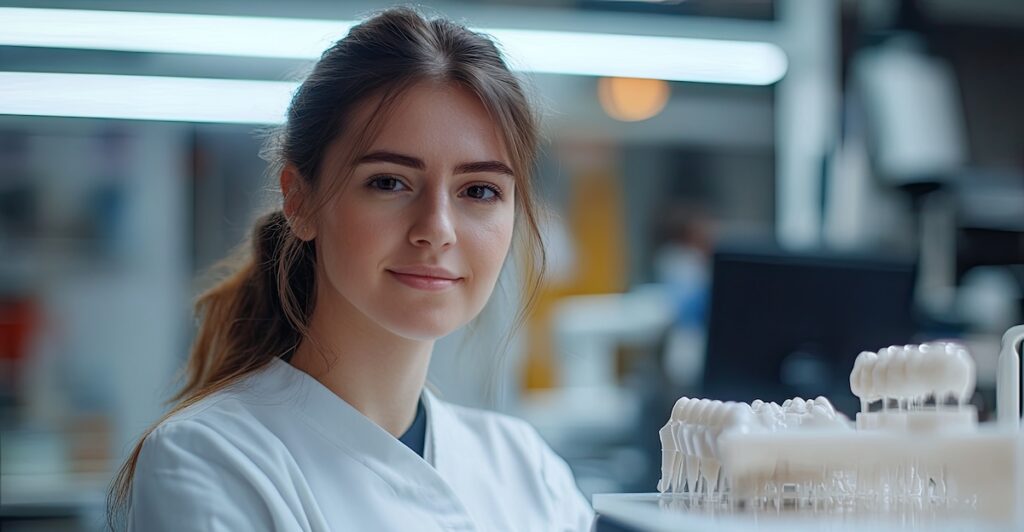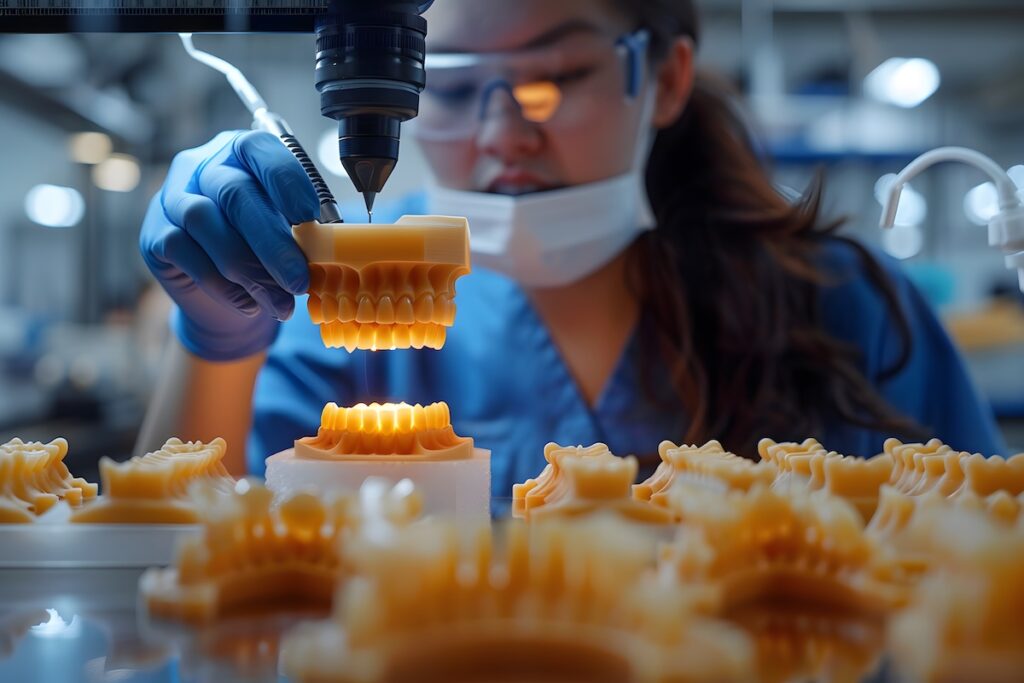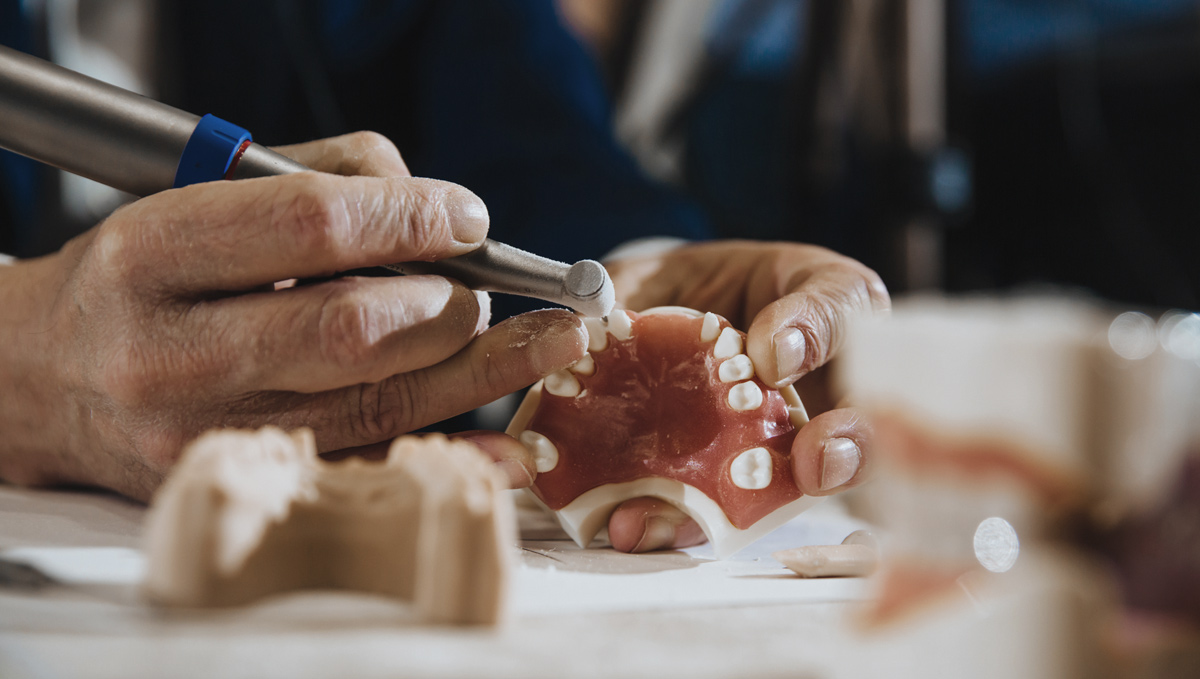Even though they happen mostly behind the scenes, dental technician jobs are an important part of the dental industry. Dental technicians work in a dental lab to make things like crowns, dentures and orthodontic appliances that help patients eat, speak and smile with confidence.
Here’s a look at what dental technicians do each day, the tools and skills they need, and how new technology is changing the way they work. Whether you are thinking about a career in dental technology or just want to learn more about the role, this guide will give you a clear and simple overview.

World of dental technology
Understanding the role of a dental technician in modern dentistry
Dental technicians are an important part of dental care because they make custom dental prosthetics and appliances. These include crowns, bridges, dentures, and implants, all made to fit each patient exactly.
A dental technician works in a dental laboratory and often works closely with dentists, dental nurses, and other dental professionals. To do well in this job, you need to be accurate, creative, and focused on doing high-quality work.
A day in the life of a dental technician
Routine responsibilities and daily workflows in the lab
Each day in a dental lab involves a series of intricate tasks. A typical full-time dental technician manages everything from receiving dental impressions to creating special trays, casting models, and designing dental prosthetics. These key responsibilities require a keen eye for detail and an ability to work under pressure.
Many labs in the UK are expanding their digital workflows, meaning technicians must now combine traditional craftsmanship with new technology.
The different types of dental technicians
From prosthetics to orthodontics – specialist paths explained
Dental technician jobs can vary widely depending on the area of specialisation. For example, a prosthetic dental technician focuses on removable appliances like dentures, while an orthodontic technician creates devices like retainers and braces. Senior dental technicians often take on more complex procedures and may supervise junior team members.
Some choose to specialise further, becoming an experienced prosthetic technician or working exclusively with dental implants. Each position within the lab requires its own blend of training, expertise, and passion.
Key tools of the trade
Traditional instruments every dental technician uses
Dental technicians use a range of essential tools to do their work to a high standard. These include articulators, wax knives, model trimmers, and polishers. Good hand skills are very important, especially when working with small and delicate items.
As technology moves forward, digital tools like 3D scanners and CAD software have become just as important. Keeping the workspace clean and tidy helps manage materials well and makes sure every dental appliance is made with care and quality.
The rise of digital dentistry
How CAD/CAM and 3D printing are reshaping the lab environment
Digital workflows are changing how dental labs work across the UK. CAD/CAM technology helps technicians design and make crowns, bridges, and orthodontic appliances with great accuracy. 3D printing makes the process quicker and creates less waste, which makes it a smart and eco-friendly option for small business labs.
An experienced dental technician must now stay updated with software, scanners, and milling machines to remain competitive in an increasingly digital environment.

Materials used in dental laboratories
An overview of metals, ceramics, resins, and composites
Dental laboratory work uses many different types of materials. Ceramics are often used for crowns and veneers because they look natural, while resins and composites are used for partial dentures and orthodontic appliances. Metals are still important for strength, especially in the frames for implants.
A skilled technician needs to know how to handle each material safely and properly, making sure every dental appliance works well and looks good.
Collaboration with dentists and other professionals
How technicians support treatment plans and patient outcomes
Dental technicians are essential members of the wider dental team. They work closely with dentists to interpret prescriptions and collaborate on treatment planning.
Regular communication ensures that the dental prosthetics created meet clinical requirements and enhance patient comfort. Technicians may also liaise with a dental nurse or practice manager when coordinating private work or managing logistics.
A friendly working environment and clear communication are crucial for ensuring positive outcomes for patients.
Training and qualifications required in the UK
Education routes, registration with the GDC, and ongoing CPD
To become a qualified dental technician in the UK, individuals must complete an approved training course and register with the General Dental Council (GDC). Most courses combine academic learning with hands-on experience in a dental lab. Ongoing training and continuing professional development (CPD) are important for career progression.
Those aiming to one day take on senior positions must show a high level of skill, a strong commitment to precision, and leadership ability. Some labs offer in-house training for those eager to join the profession or upskill within their current role.
Challenges and rewards of the job
The pressure of precision vs. the satisfaction of craftsmanship
Dental technician jobs need a mix of technical skill and creativity. It can be tough to manage the workload and produce high-quality work on time, especially in a busy dental lab.
However, there are plenty of rewards that come with the job. There is great satisfaction in crafting dental appliances that improve patients’ lives. For highly motivated individuals with a keen eye for detail, dental technology can offer a fulfilling and stable career, whether in a large company or a small business.
The future of dental technology careers
Emerging trends and the demand for skilled technicians
The need for skilled dental lab technicians is growing across the UK, especially in places like London where clinics often look for experienced or specialist technicians. The move to digital workflows and custom services means that people with CAD/CAM skills and a love for new technology are in high demand.
Whether you are looking for entry-level jobs or aiming to become a senior dental technician, the dental industry has many chances for those with the right skills and dedication.
GoDigital Dental laboratory: expert dental technicians in Nottingham
At GoDigital Dental, we combine expert craftsmanship with cutting-edge digital technology to deliver high-quality dental appliances tailored to each patient’s needs. Our highly skilled team of dental technicians is committed to precision, consistency and fast turnaround times, supporting dentists and practices across the UK. Whether it’s crowns, bridges, or implants, every product is crafted with care and attention to detail.
As a forward-thinking dental laboratory, we pride ourselves on offering reliable service, modern digital workflows and a friendly working environment for our partners. From small practices to larger clinics, we provide flexible solutions that meet a high standard of quality and performance. If you are seeking a dependable lab with advanced capabilities and a passion for excellence, GoDigital Dental is here to support you.



